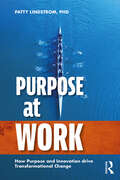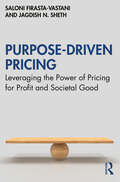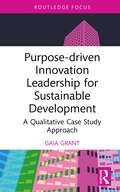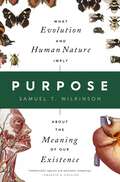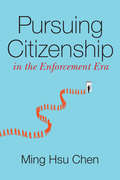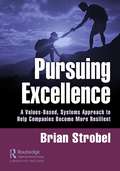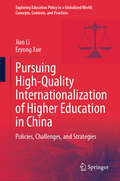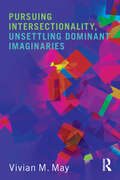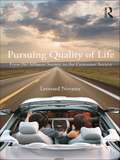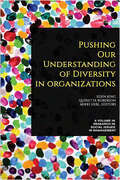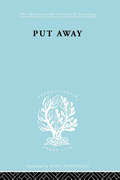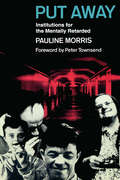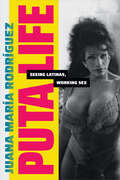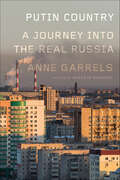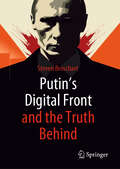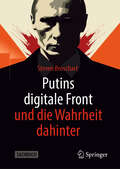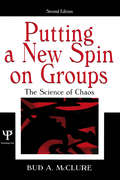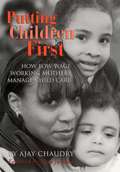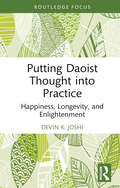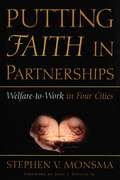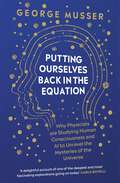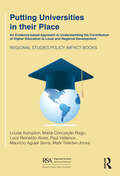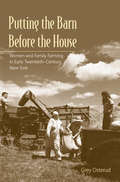- Table View
- List View
Purpose at Work: How Purpose and Innovation Drive Transformational Change
by Patty LindstromThis book offers practical frameworks, models, and case studies that will help leaders inspire and lead change effectively, making it an essential resource. It belongs on the desks of founders, entrepreneurs, CEOs, leadership teams, HR professionals, managers, and consultants across industries, as well as business students.Despite the recognition that innovation is key to growth, many companies struggle to implement it effectively. In this groundbreaking work, Patty Lindstrom introduces a three-dimensional framework for growing an organization’s capacity to innovate, focusing on defining, communicating, activating, and embedding purpose. Purpose is not just a concept—it's the catalyst for scalable growth and lasting change.Drawing on 30 years of real-world experience and insights from a comprehensive study, Lindstrom explores how purpose impacts individuals, teams, and organizations, driving clarity, confidence, and commitment. She reveals how purpose can enhance innovation capacity, transform organizational culture, and lead to tangible, positive change.
Purpose-Driven Pricing: Leveraging the Power of Pricing for Profit and Societal Good
by Jagdish N. Sheth Saloni Firasta-VastaniPricing is frequently used as a key strategic lever for management to increase profitability. However, price can also be used as a lever for societal good. This book demonstrates how effective use of price can have positive societal impacts, such as helping to reduce carbon emissions, accelerating the adoption of eco-friendly products, and improving people’s health outcomes and quality of life.This book, written by two leading thinkers on pricing strategy and practice, makes the important link between the ideals of purpose in organizations and the crucial tools of how to implement change using one of the fundamental levers at the disposal of the organization. It introduces the concept of leveraging the power of pricing for both profit and societal good and then clearly explains how it can be done. Price can be used to manage demand, incentivize consumer behavior, and influence change. The impact can be effective and quick, and it is not far-fetched to say that pro-social pricing can be utilized to preserve the environment, educate citizens, promote arts, alleviate poverty, and improve health. The book outlines how corporations, governments, civil society organizations, and collaborators can use pricing power to manage the adoption of products and services across B2B and B2C. Pricing strategies include innovating, unbundling, unpackaging, collaborating, implementing new monetization models, and applying learnings from behavioral pricing.Executives of corporate and business strategy and those dealing with brand portfolios, sustainability, social and health equity will find profound insights in this book. It will also be valuable in executive training and for graduate students.
Purpose-driven Innovation Leadership for Sustainable Development: A Qualitative Case Study Approach (ISSN)
by Gaia GrantPurpose-driven Innovation Leadership for Sustainable Development presents invaluable insights into how leaders can balance competing innovation demands. The book reports on research from an in-depth case study, which reveals the importance of developing highly adaptative and innovative responses through periods of rapid growth – while simultaneously ensuring organisational stability grounded in a clear core purpose. ‘Paradox’ theory is introduced as a constructive theoretical lens for exploring these complexities of leadership sensemaking in innovation contexts. The findings demonstrate how to incorporate both perspectives to establish a robust innovation culture.This book aims to equip readers with evidence-based principles that can be readily applied in practice. The qualitative methodology, which includes case studies and interviews conducted with global innovation leaders, uncovers powerful strategies from relevant real-world experiences. Targeted ‘Reflection and Action’ questions are also included to guide implementation.Purpose-driven Innovation Leadership for Sustainable Development will support researchers, educators, and students in the higher education sector who would like to investigate contemporary innovation leadership principles and practices. The book will also interest business leaders hoping to access rigorous research studies on the topic presented in an effective actionable format.
Purpose: What Evolution and Human Nature Imply about the Meaning of Our Existence
by Samuel T. WilkinsonBy using principles from a variety of scientific disciplines, Yale Professor Samuel Wilkinson provides a framework for human evolution that reveals an overarching purpose to our existence. Generations have been taught that evolution implies there is no overarching purpose to our existence, that life has no fundamental meaning. We are merely the accumulation of tens of thousands of intricate molecular accidents. Some scientists take this logic one step further, suggesting that evolution is intrinsically atheistic and goes against the concept of God. But is this true? By integrating emerging principles from a variety of scientific disciplines—ranging from evolutionary biology to psychology—Yale Professor Samuel Wilkinson provides a framework of evolution that implies not only that there is an overarching purpose to our existence, but what this purpose is. With respect to our evolution, nature seems to have endowed us with competing dispositions, what Wilkinson calls the dual potential of human nature. We are pulled in different directions: selfishness and altruism, aggression and cooperation, lust and love. When we couple this with the observation that we possess a measure of free will, all this strongly implies there is a universal purpose to our existence. This purpose, at least one of them, is to choose between the good and evil impulses that nature has created within us. Our life is a test. This is a truth, as old as history it seems, that has been espoused by so many of the world&’s religions. From a certain framework, these aspects of human nature—including how evolution shaped us—are evidence for the existence of a God, not against it. Closely related to this is meaning. What is the meaning of life? Based on the scientific data, it would seem that one such meaning is to develop deep and abiding relationships. At least that is what most people report are the most meaningful aspects of their lives. This is a function of our evolution. It is how we were created.
Purrieties of Language: How We Talk about Cats Online
by Edith PodhovnikAfter conquering the Internet, cats are now taking on linguistics! Since the advent of social media, cats have become a topic central to online communication, and the multitude of cat-related accounts now online has made this a world-wide phenomenon. Through cat-inspired varieties of language, we have developed a genre of cat-inspired vocabulary. And on our special social media accounts for our cats, we take on their identities, as we post, write, talk, and chat - as our feline friends. This innovative book provides linguistic analyses of the cyber 'Cativerse', exploring online language variation, and explaining key linguistic concepts – all through the lens of cat-related communication. Each chapter explores a different sociolinguistic phenomena, drawing on fun and engaging examples including memes, hashtags, captions and 'LOLcats', from platforms such as Instagram, Facebook, YouTube and Twitter. Innovative yet accessible, it is catnip for all 'hoomans' interested in how language is used online.
Pursuing Citizenship in the Enforcement Era
by Ming Hsu ChenPursuing Citizenship in the Enforcement Era provides readers with the everyday perspectives of immigrants on what it is like to try to integrate into American society during a time when immigration policy is focused on enforcement and exclusion. The law says that everyone who is not a citizen is an alien. But the social reality is more complicated. Ming Hsu Chen argues that the citizen/alien binary should instead be reframed as a spectrum of citizenship, a concept that emphasizes continuities between the otherwise distinct experiences of membership and belonging for immigrants seeking to become citizens. To understand citizenship from the perspective of noncitizens, this book utilizes interviews with more than one-hundred immigrants of varying legal statuses about their attempts to integrate economically, socially, politically, and legally during a modern era of intense immigration enforcement. Studying the experiences of green card holders, refugees, military service members, temporary workers, international students, and undocumented immigrants uncovers the common plight that underlies their distinctions: limited legal status breeds a sense of citizenship insecurity for all immigrants that inhibits their full integration into society. Bringing together theories of citizenship with empirical data on integration and analysis of contemporary policy, Chen builds a case that formal citizenship status matters more than ever during times of enforcement and argues for constructing pathways to citizenship that enhance both formal and substantive equality of immigrants.
Pursuing Excellence: A Values-Based, Systems Approach to Help Companies Become More Resilient
by Brian StrobelOur companies must start to do things differently. "While many of the ‘20 Bad Habits’ are likely present in companies trying to move up from average, surely habit No 13, ‘Clinging to the Past,’ is one of the larger detractors keeping many of them from moving closer to excellence." — Marshall Goldsmith #1 Leadership Thinker and best-selling author of What Got You Here Won’t Get You There This book is for the people who lead our companies. Our world suffered a staggering blow. We will recover. Many of our companies are still suffering. Some of them will not recover. We’re in a time of disruption. A company’s culture will play a big part in managing through this disruption. Senior leaders must establish a clear purpose, a strong set of core values, and a plan to translate strategy into action. Companies will be seeking to transform, to become more efficient and resilient. Most attempts to do so fail. They fail because we try to solve the wrong problem with the wrong system. We attempt to change the way people act. But to achieve sustained improvement, we must focus on changing the way they think. Over the last thirty years, we’ve experimented with Lean, Six Sigma, and other improvement initiatives. Each failed to move beyond average performance and sustain transformational improvement. Average then became a learned behavior. To move forward, we must unlearn some things. We must change our problem definition and our defined systems. And we can do this by framing the problem through the lens of Operational Excellence.
Pursuing High-Quality Internationalization of Higher Education in China: Policies, Challenges, and Strategies (Exploring Education Policy in a Globalized World: Concepts, Contexts, and Practices)
by Jian Li Eryong XueThis book comprehensively explores the internationalization of higher education in China from the aspects of both challenges and strategies. It analyzes the current educational policies of internationalization in China's higher education, such as the educational policies in running international schools, the educational policies of intercollegiate international exchange, the educational policies of Chinese-Foreign cooperatively run schools, and the educational policies of foreign teachers' professional development. Additionally, this book proposes specific suggestions to address the various problems of internationalization in China’s higher education.
Pursuing Intersectionality, Unsettling Dominant Imaginaries
by Vivian M. MayPursuing Intersectionality, Unsettling Dominant Imaginaries offers a sustained, interdisciplinary exploration of intersectional ideas, histories, and practices that no other text does. Deftly synthesizing much of the existing literatures on intersectionality, one of the most significant theoretical and political precepts of our time, May invites us to confront a disconcerting problem: though intersectionality is widely known, acclaimed, and applied, it is often construed in ways that depoliticize, undercut, or even violate its most basic premises. May cogently demonstrates how intersectionality has been repeatedly resisted, misunderstood, and misapplied: provocatively, she shows the degree to which intersectionality is often undone or undermined by supporters and critics alike. A clarion call to engage intersectionality’s radical ideas, histories, and justice orientations more meaningfully, Pursuing Intersectionality answers the basic questions surrounding intersectionality, attends to its historical roots in Black feminist theory and politics, and offers insights and strategies from across the disciplines for bracketing dominant logics and for orienting toward intersectional dispositions and practices.
Pursuing Quality of Life: From the Affluent Society to the Consumer Society
by Leonard NevarezFrom anxieties over work-life balance and entangling technologies, to celebrations of cool jobs and great places to live, quality of life frames the ways we enhance our lives and legitimate social change today. But how does the idea of quality of life envision the greater good, and what gets lost as a result? This book provides the critical framework for understanding the idea’s contexts and tensions that are conspicuously missing in popular discussions, professional activities, and scholarly research on quality of life. With multiple case studies taken across North America and Europe, it provides a sociological perspective on the contradictory ways we talk about and pursue quality of life in relation to technology, consumerism, family, work, public space, rural ways of life, and ultimately the final years of life. Drawing on contemporary and classical social theory, it provides an incisive account of the historical shifts in developed societies over the last half-century that have transformed our views and pursuits of quality of life. Originally a promise to undertake collective effort and pursue social justice at a moment of unprecedented opportunity, quality of life now enshrines a solipsistic ideal with which to accommodate the storms of market forces and political failure.
Pushing Our Understanding Of Diversity In Organizations: A Volume in Research in Social Issues in Management
by Michelle R. Hebl Eden King Quinetta M. RobersonFew time periods in the past five decades match the intensity of intergroup conflict that people around the world are currently experiencing. Polarized attitudes around various sociopolitical issues, such as gender equality and immigration, have dominated the media and our lives. Furthermore, these powerful social dynamics have also impacted the places where we work and intensified existing strains on workers and workplaces. To address these issues and improve organizational climates, more theories, research and collaborations to understand these phenomena are needed. The volumes in this series will describe and instigate scholarship that advances our understanding of diversity in organizations. <P><P> This volume features renowned scholars who are unabashedly pushing the field by raising the questions that need to be asked, by working on topics that have received far too little research attention, and by holding researchers, practitioners, managers, organizations, and readers to task for doing what needs to be done to maximize social justice and egalitarian behaviors in the workplace. The chapters provoke the status quo in society and in scholarship, and in so doing, push our understanding of diversity in organizations.
Put Away Ils 265: Institutions For The Mentally Retarded (International Library of Sociology)
by Pauline MorrisThis is Volume VI in a series of seven on the Sociology of Mental Health. Originally published in 1969, and using language of the time, this is a sociological study of institutions and hospitals for those with mental health conditions.
Put Away: Institutions for the Mentally Retarded (International Library Of Sociology Ser.)
by Pauline MorrisThis classic book allows its readers for the first time to comprehend the size, organization, staffing and operation of a national system of hospitals and residential services for the subnormal. It also allows for the first time, reliable estimates to be given of the scale and severity of certain problems. The basis has been laid for an evaluation of the effectiveness of hospitals for the subnormal. All this has been made possible by a generous grant from the National Society for Mentally Handicapped Children to the Department of Sociology in the University of Essex upon the foundation of the University. Of course, a great deal of further research remains to be done but a preliminary network of information is now available to all those deeply concerned about the handicapped.This is a study of the range and quality of institutional provisions made in England and Wales for that group of handicapped individuals who are known as mentally deficient. Dr. Morris reports on an investigation, which covered nearly half the hospitals for the sub-normal in the country: many of its findings can only shock and dismay.The investigation was concerned to discover what facilities-physical, occupational and educational-there was for patients, and to learn more about their social environment. It was also concerned to determine the extent to which both staff and patients are affected by their social environment, and by administrative action, and to learn something of the relationship between the hospital as an institution and the outside community, as well as between the patients and the outside world. In addition, it examined the extent to which the provisions and facilities available met the needs of the patients in relation to their physical and mental handicaps.
Puta Life: Seeing Latinas, Working Sex (Dissident Acts)
by Juana María RodríguezIn Puta Life, Juana María Rodríguez probes the ways that sexual labor and Latina sexuality become visual phenomena. Drawing on state archives, illustrated biographies, documentary films, photojournalistic essays, graphic novels, and digital spaces, she focuses on the figure of the puta—the whore, that phantasmatic figure of Latinized feminine excess. Rodríguez’s eclectic archive features the faces and stories of women whose lives have been mediated by sex work's stigmatization and criminalization—washerwomen and masked wrestlers, porn stars and sexiles. Rodríguez examines how visual tropes of racial and sexual deviance expose feminine subjects to misogyny and violence, attuning our gaze to how visual documentation shapes perceptions of sexual labor. Throughout this poignant and personal text, Rodríguez brings the language of affect and aesthetics to bear upon understandings of gender, age, race, sexuality, labor, disability, and migration. Highlighting the criminalization and stigmatization that surrounds sex work, she lingers on those traces of felt possibility that might inspire more ethical forms of relation and care.
Putin Country: A Journey into the Real Russia
by Anne GarrelsShort-listed for the Pushkin House Russian Book PrizeFrom the award-winning author of Naked in Baghdad comes Anne Garrels's revealing look into the lives of ordinary Russians, Putin Country. More than twenty years ago, the NPR correspondent Anne Garrels first visited Chelyabinsk, a gritty military-industrial center a thousand miles east of Moscow. The longtime home of the Soviet nuclear program, the Chelyabinsk region contained beautiful lakes, shuttered factories, mysterious closed cities, and some of the most polluted places on earth. Garrels’s goal was to chart the aftershocks of the U.S.S.R.’s collapse by traveling to Russia’s heartland.Returning again and again, Garrels found that the area’s new freedoms and opportunities were exciting but also traumatic. As the economic collapse of the early 1990s abated, the city of Chelyabinsk became richer and more cosmopolitan, even as official corruption and intolerance for minorities grew more entrenched. Sushi restaurants proliferated; so did shakedowns. In the neighboring countryside, villages crumbled into the ground. Far from the glitz of Moscow, the people of Chelyabinsk were working out their country’s destiny, person by person. In Putin Country, Garrels crafts an intimate portrait of Middle Russia. We meet upwardly mobile professionals, impassioned activists who champion the rights of orphans and disabled children, and ostentatious mafiosi. We discover surprising subcultures, such as a vibrant underground gay community and a circle of determined Protestant evangelicals. And we watch doctors and teachers trying to cope with inescapable payoffs and institutionalized negligence. As Vladimir Putin tightens his grip on power and war in Ukraine leads to Western sanctions and a lower standard of living, the local population mingles belligerent nationalism with a deep ambivalence about their country’s direction. Through it all, Garrels sympathetically charts an ongoing identity crisis. In the aftermath of the Soviet Union, what is Russia? What kind of pride and cohesion can it offer? Drawing on close friendships sustained over many years, Garrels explains why Putin commands the loyalty of so many Russians, even those who decry the abuses of power they regularly encounter.Correcting the misconceptions of Putin’s supporters and critics alike, Garrels’s portrait of Russia’s silent majority is both essential and engaging reading at a time when cold war tensions are resurgent.
Putin's Digital Front and the Truth Behind
by Steven BroschartPutin's war in Ukraine is not only fought on the battlefield. Combat also occurs on the digital front. Words and information are the ammunition of modern, hybrid warfare—against the opposing military, but especially against civilians. It is about manipulation and control. About confusion and distraction from what is really happening. However, the internet is used not only for propaganda but also for intelligence and logistics. In doing so, Russia leaves behind a lot of traces. Analyst Steven Broschart demonstrates in clear language that requires no prior knowledge which psychological and communicative means are employed at Putin's digital frontline.
Putins digitale Front und die Wahrheit dahinter
by Steven BroschartPutins Krieg in der Ukraine wird nicht nur auf dem Schlachtfeld ausgetragen. Gekämpft wird auch an der digitalen Front. Worte und Informationen sind die Munition der modernen, der hybriden Kriegsführung - gegen das gegnerische Militär, aber insbesondere gegen Zivilisten. Es geht um Manipulation und Kontrolle. Um Verwirrung und Ablenkung von dem, was wirklich geschieht. Doch das Internet wird nicht nur zur Propaganda, sondern auch für die Aufklärung und die Logistik genutzt. Und dabei hinterlässt Russland eine Menge Spuren. Analyst Steven Broschart zeigt konkret, welche psychologischen und kommunikativen Mittel an Putins digitaler Frontlinie zum Einsatz kommen.
Putting A New Spin on Groups: The Science of Chaos
by Bud A. McclurePutting a New Spin on Groups: The Science of Chaos, Second Edition continues to challenge orthodoxy and static ideas about small group dynamics. A primary goal is to offer an alternative model of group development that addresses three factors: *The model integrates old ideas from previous models of group development with new concepts from chaos theory and the work of Arthur Young. *The book emphasizes the importance of conflict in group development and recognizes that group growth--while progressive--is neither linear or unidimensional. *Particular attention is focused on how groups change, evolve, and mature. In addition, this book highlights certain group phenomena that have been given only cursory attention in many group textbooks, including women in authority, group metaphors, regressive groups, and the transpersonal potential of small groups. This book has been revised in response to feedback from reviewers and colleagues and includes new ideas, applications of chaos theory in social sciences, and thinking about group behavior. It is an intellectually challenging read with just the right amount of world application.
Putting Children First: How Low-Wage Working Mothers Manage Child Care
by Ajay ChaudryIn the five years following the passage of federal welfare reform law, the labor force participation of low-income, single mothers with young children climbed by more than 25 percent. With significantly more hours spent outside the home, single working mothers face a serious childcare crunch—how can they provide quality care for their children? In Putting Children First, Ajay Chaudry follows 42 low-income families in New York City over three years to illuminate the plight of these mothers and the ways in which they respond to the difficult challenge of providing for their children's material and developmental needs with limited resources. Using the words of the women themselves, Chaudry tells a startling story. Scarce subsidies, complicated bureaucracies, inflexible work schedules, and limited choices force families to piece together care arrangements that are often unstable, unreliable, inconvenient, and of limited quality. Because their wages are so low, these women are forced to rely on inexpensive caregivers who are often under-qualified to serve the developmental needs of their children. Even when these mothers find good, affordable care, it rarely lasts long because their volatile employment situations throw their needs into constant flux. The average woman in Chaudry's sample had to find five different primary caregivers in her child's first four years, while over a quarter of them needed seven or more in that time. This book lets single, low-income mothers describe the childcare arrangements they desire and the ways that options available to them fail to meet even their most basic needs. As Chaudry tracks these women through erratic childcare spells, he reveals the strategies they employ, the tremendous costs they incur and the anxiety they face when trying to ensure that their children are given proper care. Honest, powerful, and alarming, Putting Children First gives a fresh perspective on work and family for the disadvantaged. It infuses a human voice into the ongoing debate about the effectiveness of welfare reform, showing the flaws of a social policy based solely on personal responsibility without concurrent societal responsibility, and suggesting a better path for the future.
Putting Daoist Thought into Practice: Happiness, Longevity, and Enlightenment
by Devin K. JoshiThis book shows how Chinese wisdom originating many centuries ago is still highly relevant to our lives today as the Daoist classics provide insightful prescriptions on how to live a life full of happiness, contentment, and healthy longevity. They also provide guidance regarding personal ethics, sustainable economics, and achieving enlightenment.The book contains reflections on how to achieve happiness drawing from the Liezi, a Daoist classic, and it examines Daoist ideas about nourishing life to achieve longevity and the marked similarity between these principles and people living in “blue zones” today with the highest concentration of centenarians. It explores Daoist views on consciousness and enlightenment in the Laozi and Zhuangzi and their close resemblance to some of the most influential “new age” teachings on the subject. It highlights the ethical character of a Daoist sage by drawing on the Daoist classic of the Wenzi and enumerates lessons for transitioning toward a sustainable economy from the Daodejing.Covering multiple dimensions of classical Daoist thought and their contemporary applications to human development and well-being, this text will usefully inform scholars, students, and researchers of Asian studies, religion, and philosophy, and individuals seeking self-improvement and personal wellness.
Putting Faith in Partnerships: Welfare-to-Work in Four Cities
by Stephen V. MonsmaPutting Faith in Partnerships addresses a major conceptual change in American domestic policy, begun by Reagan and now fully realized by the Bush administration: the shift of responsibility for social services from the federal government to states and communities. In this groundbreaking study of a politically controversial topic---the debut offering in Alan Wolfe's Contemporary Political and Social Issues series---author Stephen Monsma avoids overheated rhetoric in favor of a careful, critical analysis of the hard evidence on whether public-private partnerships really work. The book is based on in-depth studies of social service programs in Los Angeles, Chicago, Philadelphia, and Dallas. By examining public-private partnerships between government offices and nonprofit organizations, Monsma seeks to understand how these partnerships affect the balance between government's efforts to deal with social problems and the rights of individual citizens to control their own lives.
Putting Ourselves Back in the Equation: Why Physicists Are Studying Human Consciousness and AI to Unravel the Mysteries of the Universe
by George MusserDistant galaxies, dark matter, black holes – elusive, incomprehensible and inhospitable – these are the building blocks of modern physics. But where do we fit in this picture? For centuries, we have separated mind from matter. While physicists have pursued a theory of &‘everything&’ with single-minded purpose, the matter of the mind, of human consciousness, has been conveniently sidestepped and ignored – consigned to priests, philosophers and poets. With the ambition of Stephen Hawking, Carlo Rovelli and Brian Cox, Putting Ourselves Back in the Equation sets out a bold new vision for theoretical physics, unrestricted by sleek equations and neat formulations. Combining cutting-edge neuroscience with the latest in quantum mechanics, acclaimed writer Musser offers a new interpretation of human consciousness. From bizarre cognitive phenomena, like lucid dreaming and self-taught synaesthesia, to the latest technological developments in AI, Musser asks: what can physics teach us about what it means to be human?
Putting Universities in their Place: An Evidence-based Approach to Understanding the Contribution of Higher Education to Local and Regional Development (Regional Studies Policy Impact Books)
by Mark Tewdwr-Jones Paul Vallance Louise Kempton Maria Conceição Rego Lucir Reinaldo Alves Maurício Aguiar SerraThere have been several attempts in recent years to create conceptual frameworks and models to help universities and policy makers understand the role and contribution of higher education to local and regional development. However, these models have failed to fully reflect or give insufficient attention to the impact of the regional context (economic, social, political), the policy environment for higher education and territorial development and the diversity of management and leadership structures of universities themselves. This has led to the development of static models that rarely work outside of the immediate context in which they were developed and therefore risk leading to design of policies that are not fit for purpose. This Policy Expo is the result of work with partners in Europe, South America, Africa, Asia and Australia to develop a new approach, the ORPHIC Framework, to think about how the university can be adapted to the specificity of institutional and local contexts. The book examines: • What are the different roles that universities play in local and regional development and how do these manifest themselves? • How can we learn from comparing practice and experience internationally, and to what extent are policies aimed at promoting university–region relationships transferrable? • What are the internal university factors, such as management and leadership, history, mission, structures, and the external factors, such as territorial development policy context, governance system, nature of the ‘place’, that might help us explain the nature of the relationship?
Putting a Name to It: Diagnosis in Contemporary Society
by Annemarie Goldstein JutelFinalist, Foundation for the Sociology of Health and Illness Book Prize, British Sociological AssociationOver a decade after medical sociologist Phil Brown called for a sociology of diagnosis, Putting a Name to It provides the first book-length, comprehensive framework for this emerging subdiscipline of medical sociology.Diagnosis is central to medicine. It creates social order, explains illness, identifies treatments, and predicts outcomes. Using concepts of medical sociology, Annemarie Goldstein Jutel sheds light on current knowledge about the components of diagnosis to outline how a sociology of diagnosis would function. She situates it within the broader discipline, lays out the directions it should explore, and discusses how the classification of illness and framing of diagnosis relate to social status and order. Jutel explains why this matters not just to doctor-patient relationships but also to the entire medical system. As a result, she argues, the sociological realm of diagnosis encompasses not only the ongoing controversy surrounding revisions to the Diagnostic and Statistical Manual of Mental Disorders in psychiatry but also hot-button issues such as genetic screening and pharmaceutical industry disease mongering.Both a challenge and a call to arms, Putting a Name to It is a lucid, persuasive argument for formalizing, professionalizing, and advancing longstanding practice. Jutel’s innovative, open approach and engaging arguments will find support among medical sociologists and practitioners and across much of the medical system.
Putting the Barn Before the House: Women and Family Farming in Early Twentieth-Century New York
by Grey OsterudPutting the Barn Before the House features the voices and viewpoints of women born before World War I who lived on family farms in south-central New York. As she did in her previous book, Bonds of Community, for an earlier period in history, Grey Osterud explores the flexible and varied ways that families shared labor and highlights the strategies of mutuality that women adopted to ensure they had a say in family decision making. Sharing and exchanging work also linked neighboring households and knit the community together. Indeed, the culture of cooperation that women espoused laid the basis for the formation of cooperatives that enabled these dairy farmers to contest the power of agribusiness and obtain better returns for their labor. Osterud recounts this story through the words of the women and men who lived it and carefully explores their views about gender, labor, and power, which offered an alternative to the ideas that prevailed in American society. Most women saw "putting the barn before the house"-investing capital and labor in productive operations rather than spending money on consumer goods or devoting time to mere housework-as a necessary and rational course for families who were determined to make a living on the land and, if possible, to pass on viable farms to the next generation. Some women preferred working outdoors to what seemed to them the thankless tasks of urban housewives, while others worked off the farm to support the family. Husbands and wives, as well as parents and children, debated what was best and negotiated over how to allocate their limited labor and capital and plan for an uncertain future. Osterud tells the story of an agricultural community in transition amid an industrializing age with care and skill.
